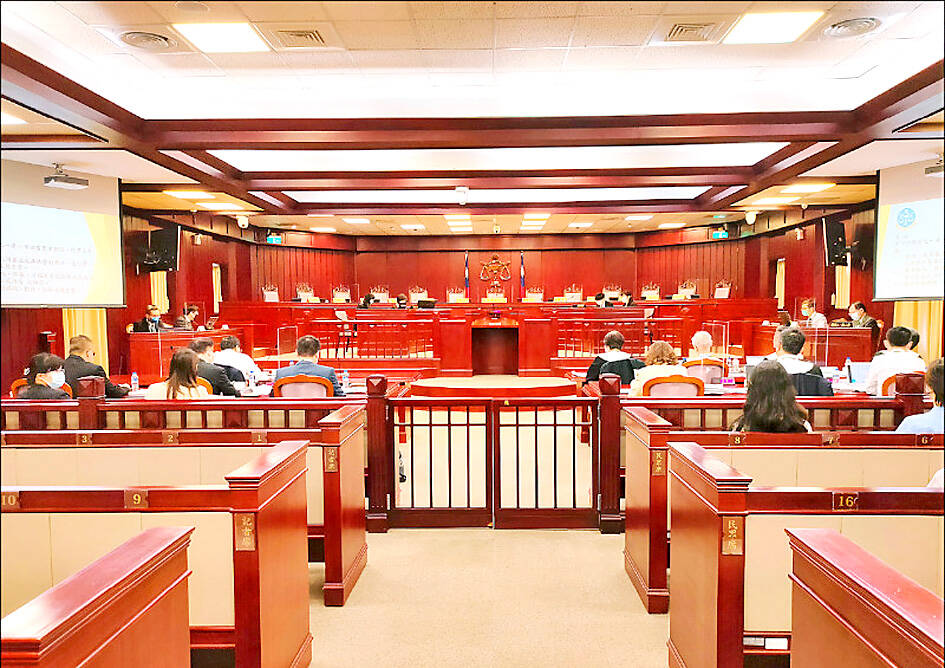The Constitutional Court is next month to start the process of handling a constitutional challenge calling for the use of swear words to be decriminalized in connection with public insults.
The challenge was brought by prominent figures involved in related lawsuits, such as media personality Neil Peng (馮光遠), author Chang Ta-chuen (張大春) and sports agent Yang Hui-ju (楊蕙如).
Peng was found guilty of public insult and fined NT$5,000 after calling former National Security Council secretary-general King Pu-tsung (金溥聰) “a rotten egg,” “scum” and a “sleazebag” in 2015.

Photo: Taipei Times file
Chang had to pay a fine of NT$3,000 after being was found guilty of public insult for saying that media personality Liu Chun-yao (劉駿耀) had a head “full of shit,” and was “sleazy” and “shameless” in 2015.
Yang was found guilty of insulting a public official after instructing a man surnamed Tsai (蔡) to post messages online criticizing diplomatic officials at Taiwan’s representative office in Osaka, Japan, for their alleged failure to assist Taiwanese passengers stranded at Osaka Kansai International Airport during a typhoon in 2018.
Yang last year paid a NT$150,000 fine in lieu of serving a five-month sentence.
She is among eight plaintiffs challenging the offense of insulting a public official, saying it infringes on her freedom of speech.
The offense falls under Article 149 of the Criminal Code, and those found guilty of it can be sentenced to up to one year in prison and fined up to NT$100,000.
Thirty plaintiffs are challenging the public insult offense. Most of them were convicted under Article 309 of the Criminal Code, which imposes a fine of up to NT$9,000.
Some of the cases involved the utterance of obscene terms, colloquial expletives or other slurs such as “slut” or “idiot.”
Judicial Yuan President Hsu Tzong-li (許宗力), who heads the Constitutional Court, said that the oral arguments on public insults and insulting a public official would be heard on Dec. 25 and 26 respectively.
By law, a ruling must be made within three months of that date, although a two-month extension can be granted.
Before becoming president of the Judicial Yuan in 2016, Hsu in 2012 criticized the authorities and courts for indicting people for insulting others.
Hsu at the time recommended a review, saying the courts should interpret tarnishing of one’s character and dignity as relating to hatred “based on race, religious beliefs, gender and sexual orientation.”
More common insults such as the use of expletives during disputes, although they could hurt someone’s feelings, should not be an issue court should have to deal with, Hsu said.

Taiwan is to commence mass production of the Tien Kung (天弓, “Sky Bow”) III, IV and V missiles by the second quarter of this year if the legislature approves the government’s NT$1.25 trillion (US$39.78 billion) special defense budget, an official said yesterday. Commenting on condition of anonymity, a defense official with knowledge of the matter said that the advanced systems are expected to provide crucial capabilities against ballistic and cruise missiles for the proposed “T-Dome,” an advanced, multi-layered air defense network. The Tien Kung III is an air defense missile with a maximum interception altitude of 35km. The Tien Kung IV and V

The disruption of 941 flights in and out of Taiwan due to China’s large-scale military exercises was no accident, but rather the result of a “quasi-blockade” used to simulate creating the air and sea routes needed for an amphibious landing, a military expert said. The disruptions occurred on Tuesday and lasted about 10 hours as China conducted live-fire drills in the Taiwan Strait. The Civil Aviation Administration (CAA) said the exercises affected 857 international flights and 84 domestic flights, affecting more than 100,000 travelers. Su Tzu-yun (蘇紫雲), a research fellow at the government-sponsored Institute for National Defense and Security Research, said the air

Trips for more than 100,000 international and domestic air travelers could be disrupted as China launches a military exercise around Taiwan today, Taiwan’s Civil Aviation Administration (CAA) said yesterday. The exercise could affect nearly 900 flights scheduled to enter the Taipei Flight Information Region (FIR) during the exercise window, it added. A notice issued by the Chinese Civil Aviation Administration showed there would be seven temporary zones around the Taiwan Strait which would be used for live-fire exercises, lasting from 8am to 6pm today. All aircraft are prohibited from entering during exercise, it says. Taipei FIR has 14 international air routes and

Taiwan lacks effective and cost-efficient armaments to intercept rockets, making the planned “T-Dome” interception system necessary, two experts said on Tuesday. The concerns were raised after China’s military fired two waves of rockets during live-fire drills around Taiwan on Tuesday, part of two-day exercises code-named “Justice Mission 2025.” The first wave involved 17 rockets launched at 9am from Pingtan in China’s Fujian Province, according to Lieutenant General Hsieh Jih-sheng (謝日升) of the Office of the Deputy Chief of the General Staff for Intelligence at the Ministry of National Defense. Those rockets landed 70 nautical miles (129.6km) northeast of Keelung without flying over Taiwan,